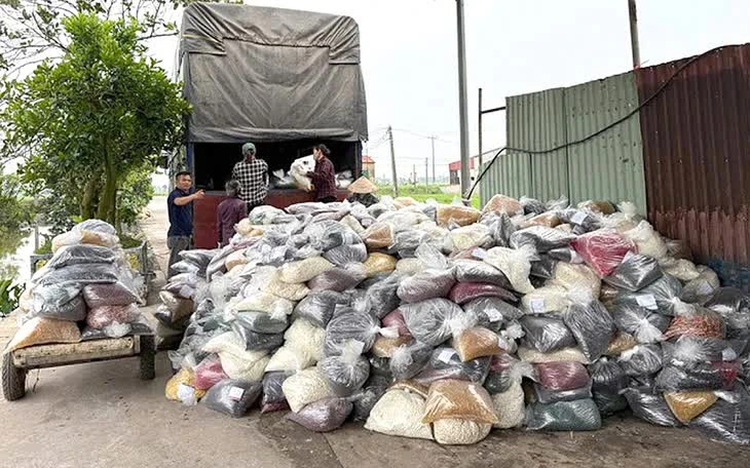
A shipment of counterfeit dietary supplements weighing up to 100 tonnes was discovered and seized by police. Photo: Provided by police
Nguyen Thanh Phong, former head of the Vietnam Food Administration under the Ministry of Health, along with several other officials, has been prosecuted and detained by the Ministry of Public Security's investigative agency on suspicion of wrongdoing and accepting bribes in connection with a ring that produced and distributed hundreds of tonnes of counterfeit dietary supplements.
This development, which has been welcomed by consumers, signals that authorities are now seriously addressing the counterfeit goods issue after a prolonged period of public concern.
In recent days, the revelation that over half a million fake milk products remained on the market for nearly five years has stirred renewed outrage among the public and consumers.
The arrest of a former top official responsible for food safety – for allegedly colluding with businesses to produce fake goods – has offered a sense of resolution to public frustration, as authorities appear to be cracking down at the 'final checkpoint.'
So why have fake foods, fake milk, and many other bogus products been able to thrive in the market for so many years without detection?
Why were businesses violating ethical standards not exposed?
And how have even the most informed consumers been misled by fake products on the market?
A host of reasons have been cited, such as inadequate enforcement of inspection responsibilities, overlapping areas of jurisdiction, and bribery among some officials tasked with overseeing and regulating these products.
Currently, most goods – especially food – must pass through two checkpoints before reaching consumers: pre-inspection and post-inspection.
Medicines and milk for children under three are subject to pre-inspection regulations. For general food products, regulatory oversight focuses primarily on post-inspection during production and distribution.
Every stage, from licensing, manufacturing, quality control, distribution, to retail, is supposed to be monitored by relevant authorities.
Yet according to the National Steering Committee 389, in the first four months of 2025 alone, over 34,000 violations were uncovered and dealt with by agencies and local authorities.
These included more than 8,200 cases of trafficking and transporting prohibited or smuggled goods; over 25,100 cases involving commercial and tax fraud; and more than 1,100 cases involving counterfeit goods and intellectual property violations.
Authorities collected over VND4.897 trillion (US$188.6 million) for the state budget and launched criminal proceedings in nearly 1,400 cases involving more than 2,100 individuals.
These staggering figures point to the long-standing presence of counterfeit milk, supplements, and other fake goods, often only discovered years after entering the market and typically only in response to public complaints. In many instances, inspections and penalties ultimately amount to little more than temporary measures.
While the state has assigned food safety oversight to various agencies at both central and local levels, the lack of coordination and overlapping responsibilities have severely undermined effectiveness.
Moreover, the laxity in both pre- and post-market inspections has created loopholes that unethical businesses have exploited, allowing counterfeit products to infiltrate the market.
This environment has also allowed certain officials – the 'needles' hidden in the system – to shield counterfeiters for personal gain. As a result, fake food products have been able to circulate, harming both consumers and society.
Alongside the need for businesses to prioritize ethical practices and comply with the law, regulatory bodies must fulfill their responsibilities – and above all, root out the 'bad apples' in the system.
These 'needles' must be removed to ensure stricter enforcement, restore a healthy business environment, and guarantee that safe, high-quality products reach consumers.


Max: 1500 characters
There are no comments yet. Be the first to comment.